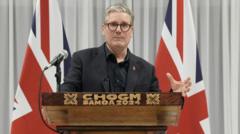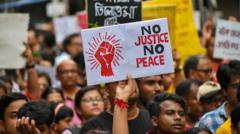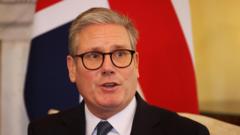During a two-day summit in Samoa, Commonwealth leaders, including UK Prime Minister Sir Keir Starmer, expressed the need for discussions on reparations for the slave trade, highlighting a growing movement against the UK government's stance on the issue.
Commonwealth Leaders Initiate Dialogue on Reparations Amidst UK Resistance

Commonwealth Leaders Initiate Dialogue on Reparations Amidst UK Resistance
Conversations on reparatory justice for the transatlantic slave trade gain traction at Commonwealth summit, despite UK’s refusal to entertain reparations.
Time has come for reparations dialogue, Commonwealth heads agree. Commonwealth leaders have boldly initiated discussions regarding reparations for the transatlantic slave trade, even though the UK government has been reticent to include this topic in official discourse. In a statement endorsed by 56 representatives, including UK Prime Minister Sir Keir Starmer, the leaders emphasized the necessity for a "meaningful, truthful and respectful conversation" about the historical injustices stemming from the slave trade.
While Prime Minister Starmer maintained the UK’s position against financial reparations, acknowledging no monetary discussions took place during the summit, there remains a palpable tension surrounding the issue. The UK has experienced mounting pressure from Commonwealth nations to acknowledge its historical transgressions and consider various forms of reparative measures, which could span financial restitution or symbolic acts of acknowledgment.
Starmer characterized the summit as productive, diverting focus towards resilience and climate change as the primary themes, while identifying discussions on reparative justice as a singular paragraph in a broader, multifaceted document. The Prime Minister's remarks downplayed the severity of the reparations dialogue, reinforcing the UK’s unwavering stance that it does not intend to pay reparations, as reiterated by Chancellor Rachel Reeves.
Prior to the release of the joint statement, a closed-door session among Commonwealth leaders lasted approximately six hours, with insiders suggesting that the reparations discourse did not extend the meeting’s duration. "We’ve been clear on our position and it’s not changing," a Downing Street source stated, reflecting the government’s steadfastness despite international calls for acknowledgment.
Nevertheless, the communique serves a dual purpose; it allows those advocating for reparations to declare that the dialogue persists while simultaneously enabling the UK and other nations to highlight their focus on diverse topics such as trade and climate issues. Prime Minister Starmer hinted that further examination regarding reparatory justice could emerge at the UK-Caribbean forum scheduled for 2025, leaving a pathway open for renewed discussions in the future regarding the legacy of slavery within the Commonwealth.






















